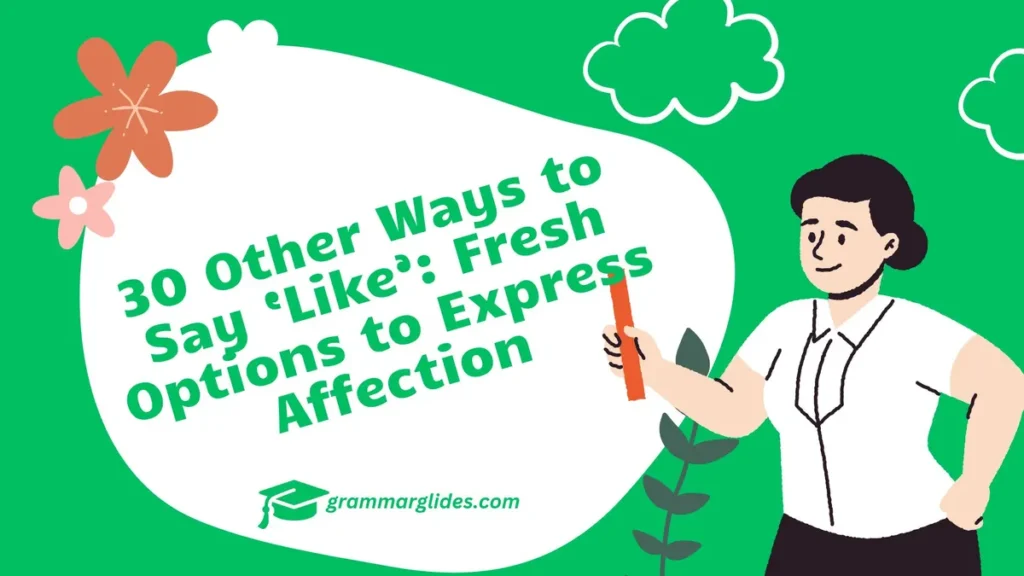“Explore new ways to express affection and deepen your connections!”
In a world where communication is key, finding the right words to express affection can make all the difference. The word “like” often serves as a go-to option for showing fondness, but sometimes it falls short of conveying our true feelings. This blog post explores 30 fresh alternatives to help you articulate your emotions more vividly.
Whether you’re chatting with a friend, writing a romantic note, or expressing appreciation, these phrases can enhance your communication skills and strengthen your connections.
Now that we’ve set the stage, let’s dive deeper into why diversifying your vocabulary matters. Words hold power, and using varied expressions can enrich your conversations. By substituting “like” with more specific phrases, you can convey deeper emotions and create a more engaging dialogue. So, let’s embark on this journey to discover fresh ways to express your affection and make your interactions more meaningful.
Throughout this post, we will share 30 alternative phrases to “like” along with scenarios and examples to help you understand how to use them effectively. Each heading will provide insights into how these expressions can fit into your everyday conversations. Let’s get started!
1. Enjoy
Scenario: Sharing a favorite hobby.
Example 1: “I enjoy hiking in the mountains every weekend.”
Example 2: “She really enjoys cooking new recipes.”
Explanation: “Enjoy” conveys a sense of pleasure and satisfaction in an activity. It implies active engagement and appreciation, making it a great substitute for “like.” This word captures the joy found in experiences and pursuits.
2. Appreciate

Scenario: Expressing gratitude for a gift.
Example 1: “I really appreciate the thoughtful gift you gave me.”
Example 2: “He appreciates the beauty of nature.”
Explanation: “Appreciate” goes beyond simple enjoyment to acknowledge value or worth. It signifies a deeper recognition of the positive impact something has, making it more meaningful. This word reflects gratitude and respect.
3. Prefer
Scenario: Choosing between two options.
Example 1: “I prefer tea over coffee in the morning.”
Example 2: “She prefers reading fiction to nonfiction.”
Explanation: “Prefer” indicates a clear choice or favoritism toward one option over another. It communicates a more decisive stance, making it ideal for expressing tastes or inclinations. This word showcases personal choices.
4. Adore
Scenario: Talking about a favorite movie.
Example 1: “I adore classic films; they never get old.”
Example 2: “She adores her pet cat.”
Explanation: “Adore” conveys deep affection and love for someone or something. It suggests a passionate admiration that surpasses mere liking, allowing you to express a heartfelt connection. This word infuses warmth and sentiment.
5. Favor

Scenario: Choosing a favorite dessert.
Example 1: “I favor chocolate cake over any other dessert.”
Example 2: “He favors action movies.”
Explanation: “Favor” implies preference, often used in contexts of choice or support. It suggests a slight bias towards something, indicating that you hold it in higher regard. This word carries a sense of endorsement.
6. Relish
Scenario: Enjoying a favorite meal.
Example 1: “I relish every bite of this gourmet burger.”
Example 2: “She relishes the time spent with family.”
Explanation: “Relish” emphasizes savoring an experience, making it a vibrant alternative to “like.” It suggests taking pleasure in the moment, often with a sensory or emotional focus. This word evokes a sense of indulgence.
7. Cherish
Scenario: Valuing a cherished memory.
Example 1: “I cherish the memories of my childhood.”
Example 2: “He cherishes his friendships.”
Explanation: “Cherish” conveys a profound appreciation, often associated with emotional attachment. It indicates that something holds significant value in your life, making it an ideal choice for expressing deep affection. This word reflects emotional depth.
8. Have a passion for

Scenario: Discussing favorite activities.
Example 1: “I have a passion for photography.”
Example 2: “She has a passion for dance.”
Explanation: This phrase indicates a strong enthusiasm or love for an activity, signifying dedication and commitment. It conveys a sense of purpose and intensity, showcasing your interests in a more compelling manner. This phrase highlights a strong engagement.
9. Care for
Scenario: Talking about someone special.
Example 1: “I really care for my friends and family.”
Example 2: “She cares for her community.”
Explanation: “Care for” emphasizes concern and affection, suggesting a nurturing attitude. It implies a sense of responsibility and emotional investment, making it suitable for expressing feelings toward others. This phrase reveals empathy and compassion.
10. Dig

Scenario: Expressing enthusiasm for music.
Example 1: “I really dig this new album!”
Example 2: “He digs indie films.”
Explanation: “Dig” is a casual, informal way to express enjoyment or approval. It conveys enthusiasm and a laid-back vibe, making it suitable for casual conversations. This word adds a youthful, vibrant flair.
11. Treasure
Scenario: Valuing a special gift.
Example 1: “I treasure this necklace my grandmother gave me.”
Example 2: “He treasures his time spent traveling.”
Explanation: “Treasure” conveys a deep appreciation, often associated with sentimental value. It suggests holding something dear and valuable, making it a heartfelt alternative to “like.” This word expresses affection for meaningful experiences.
12. Revel in
Scenario: Enjoying a vacation.
Example 1: “I revel in the sunshine during my beach holidays.”
Example 2: “She revels in the excitement of live concerts.”
Explanation: “Revel in” suggests indulging in an experience, emphasizing enjoyment and celebration. It conveys a sense of joy and satisfaction, making it a vivid alternative for expressing positive feelings. This phrase suggests a festive appreciation.
13. Take pleasure in
Scenario: Enjoying a hobby.
Example 1: “I take pleasure in gardening.”
Example 2: “She takes pleasure in painting.”
Explanation: This phrase indicates enjoyment and satisfaction derived from an activity. It reflects a thoughtful appreciation, making it suitable for expressing hobbies and interests. This phrase highlights a reflective enjoyment.
14. Be into
Scenario: Discussing interests.
Example 1: “I’m really into learning new languages.”
Example 2: “He’s into fitness and healthy living.”
Explanation: “Be into” is an informal way to express enthusiasm or interest in something. It conveys a personal connection and active involvement, making it a relatable alternative. This phrase adds a casual tone to your expression.
15. Enthuse about

Scenario: Talking about a recent discovery.
Example 1: “I enthuse about my recent trip to Italy.”
Example 2: “She enthuses about her new job.”
Explanation: “Enthuse about” conveys excitement and passion for a subject or experience. It suggests a lively and engaging way to express your feelings, enhancing communication. This phrase radiates positive energy and enthusiasm.
16. Be partial to
Scenario: Discussing favorite foods.
Example 1: “I’m partial to Italian cuisine.”
Example 2: “She’s partial to classic rock music.”
Explanation: “Be partial to” indicates a slight preference or favoritism toward something. It conveys a subtle inclination rather than an outright declaration, adding nuance to your expression. This phrase suggests a gentle favoritism.
17. Fancy
Scenario: Talking about a crush.
Example 1: “I really fancy that new café in town.”
Example 2: “She fancies a particular band.”
Explanation: “Fancy” is a more playful way to express liking or attraction. It suggests a light-hearted, sometimes romantic feeling, making it suitable for casual conversations. This word adds a charming touch to your expression.
18. Connect with
Scenario: Discussing friendships.
Example 1: “I really connect with people who love traveling.”
Example 2: “She connects with others through her passion for art.”
Explanation: “Connect with” emphasizes establishing a bond or shared experience with someone. It conveys a sense of understanding and emotional resonance, enhancing interpersonal communication. This phrase highlights relational depth.
19. Be fond of

Scenario: Discussing favorite hobbies.
Example 1: “I’m fond of painting; it’s my creative outlet.”
Example 2: “He’s fond of reading mystery novels.”
Explanation: “Be fond of” conveys a gentle affection or preference for someone or something. It suggests warmth and nostalgia, making it suitable for expressing positive feelings. This phrase adds a tender quality to your expression.
20. Have a thing for
Scenario: Sharing preferences with friends.
Example 1: “I have a thing for vintage clothing.”
Example 2: “She has a thing for romantic movies.”
Explanation: This phrase suggests a personal interest or attraction, often in a light-hearted manner. It conveys a casual yet strong preference, making it a relatable alternative. This phrase adds a playful tone to your interests.
21. Crush on
Scenario: Talking about a romantic interest.
Example 1: “I have a crush on my classmate.”
Example 2: “She crushes on that actor; she thinks he’s charming.”
Explanation: “Crush on” is a playful way to express admiration, often in a romantic context. It conveys excitement and infatuation, making it suitable for expressing feelings of attraction. This phrase adds youthful exuberance.
22. Relate to

Scenario: Finding common ground.
Example 1: “I can relate to his experiences as an artist.”
Example 2: “She relates to the struggles of being a student.”
Explanation: “Relate to” indicates empathy or understanding, often in shared experiences. It conveys a sense of connection and resonance, enhancing communication with others. This phrase fosters a sense of camaraderie.
23. Savor
Scenario: Enjoying a delicious meal.
Example 1: “I savor every moment at this fine dining restaurant.”
Example 2: “She savors her favorite dessert.”
Explanation: “Savor” emphasizes taking time to enjoy an experience, often with a focus on taste or enjoyment. It suggests a deliberate appreciation, making it a flavorful alternative to “like.” This word invokes sensory pleasure.
24. Have a soft spot for
Scenario: Talking about favorite pets.
Example 1: “I have a soft spot for rescue animals.”
Example 2: “She has a soft spot for classic literature.”
Explanation: This phrase indicates a gentle affection or fondness, often associated with nostalgia. It conveys emotional warmth, making it suitable for expressing love or appreciation. This phrase highlights tenderness.
25. Admire

Scenario: Expressing respect for a role model.
Example 1: “I admire her dedication to her craft.”
Example 2: “He admired the work of famous artists.”
Explanation: “Admire” conveys respect and appreciation for someone’s qualities or achievements. It suggests a deeper level of regard, making it a powerful alternative to “like.” This word reflects admiration and esteem.
26. Appreciate the beauty of
Scenario: Enjoying nature.
Example 1: “I appreciate the beauty of sunsets.”
Example 2: “She appreciates the beauty of classical music.”
Explanation: This phrase emphasizes recognition of beauty or value in something. It conveys a thoughtful appreciation, making it suitable for expressing admiration for aesthetics. This phrase enriches your expression of admiration.
27. Gravitate towards
Scenario: Discussing interests in art.
Example 1: “I gravitate towards abstract art.”
Example 2: “She gravitates towards adventurous books.”
Explanation: “Gravitate towards” suggests an attraction or inclination toward something, often instinctive. It conveys a natural pull, making it an evocative alternative for expressing preferences. This phrase highlights organic inclinations.
28. Yearn for

Scenario: Expressing longing for a place.
Example 1: “I yearn for the freedom of travel.”
Example 2: “She yearns for the warmth of home.”
Explanation: “Yearn for” conveys a deep desire or longing, often with emotional weight. It suggests a heartfelt craving, making it a powerful choice for expressing strong feelings. This phrase conveys intensity and depth.
29. Hold dear
Scenario: Talking about family memories.
Example 1: “I hold dear the moments spent with my grandparents.”
Example 2: “He holds dear his childhood friends.”
Explanation: “Hold dear” signifies valuing something greatly, often with emotional significance. It conveys a sense of attachment and fondness, making it a heartfelt alternative to “like.” This phrase evokes cherished memories.
30. Connect with

Scenario: Finding common ground.
Example 1: “I can connect with her love for nature.”
Example 2: “He connects with people through storytelling.”
Explanation: “Connect with” emphasizes establishing a bond or shared experience with someone. It conveys a sense of understanding and emotional resonance, enhancing interpersonal communication. This phrase highlights relational depth.
Conclusion
By utilizing these 30 alternatives to “like,” you can enhance your vocabulary and express your feelings with more precision and depth. Each alternative conveys unique nuances, allowing you to articulate your thoughts and emotions more effectively. Embrace these words to enrich your conversations and connect with others in meaningful ways.
If You Interested in another post click our Below Link:
Other Ways to say Farewell Message to Colleagues
Other ways to say Call Out of Work Text
Other ways to say Grateful for Choosing Me as Your Loving Mom

Hi! I’m Lauren Reynolds, the author of Grammar Glides. I create easy-to-follow content that helps you master English with confidence. Let’s make learning English simple and enjoyable together!

